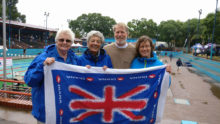
Yet more qualifying times!
February 22, 2018 Masters BlogsVerity Dobbie (Chair of the HCMSMG) explains the reasoning behind the qualifying times for the British Masters Championships 2018.
A topic for debate
Qualifying times continue to be a topic for debate, particularly because for the first time qualifying times will be required if you want to enter the British Masters Swimming Championships in Plymouth.
For further background I wrote a lengthy blog post last year explaining the thinking behind the qualifying times for the Swim England National Masters Championships. (and contrary to popular belief there was a lot of thought, consultation and discussion went into them).
But in brief, the popularity of the Swim England short course event at Sheffield demanded some way of making the event manageable if we wished to retain the three-day format with reasonable session times for competitors and officials alike.
The pressure on the long course event was not quite so acute as long course swimming is not as popular and the entry is dictated by the location of the pool. Generally speaking, the majority of Masters are concentrated in the South and events there are better attended.
Entries at Plymouth
We anticipated that the entry at Plymouth this year will be sizeable and therefore the decision was taken to introduce qualifying times for this event.
The times were set at 200 decathlon points, which ensures that there is a uniform qualifying standard across all age groups and events.
In theory, because the times are age adjusted the same standard of swim will be required whether you are a 25-year old or an 85-year old.
Following the British Masters in Swansea in 2014, the decision was taken to remove the 1500m from the programme because of pressure of time.
It is trite to say, but the 1500 is an expensive event to run in terms of pool time. Attempts were made to hold a separate event but because of budgetary constraints we weren’t able to.
People may remember there was no 1500 in either Manchester in 2015 or Sheffield in 2016. The 1500 was reinstated as a one-off in Aberdeen last year because it was anticipated that the entry would be less given the location of the championships and there would be time to hold it.
A decision on 1500m
The HCMSMG discussed the meet in Plymouth and its initial decision was not to reinstate the 1500 but to hold a separate one-day event at a centrally located 50m pool.
Enquiries were made of pretty much every 50m pool in England with the costs and finding a suitable date proving to be insurmountable obstacles.
We were disappointed by this and as a result we looked at allowing a limited number of heats at Plymouth as a compromise.
It was recognised that this was not an ideal solution but it does provide an opportunity for some people to compete at this event.
Having made that decision, we considered the conditions, including whether or not we should swim two to a lane, but ultimately decided that this would be a backward step from a quality point of view, as well as causing technical issues.
Given the limited number of heats we felt that a simple first come, first served was not appropriate and therefore we adjusted the qualifying times to make it harder, setting the bar at 450 decathlon points.
Drawing the line at this level would give us a potential entry of 100 swimmers. Assuming that not everyone who has a qualifying time will want to swim, we chose the first come, first served method for selecting the swimmers from that pool.
This is simple and gives some immediate certainty to swimmers who will know within a short period (if not immediately) that they have been accepted and can make their travel arrangements.
Response to the initial reaction
Dealing with some of the comments on social media in relation to this, the more stringent qualifying times may well require performances that are faster than the British record if the record for that particular age group is a ‘weak’ record.
The criteria is aimed at trying to be fair to all age groups and only allowing swimmers of a certain standard to compete.
As has been pointed out, the 85-89 women’s QT is an error, although I can understand how that has been made as it is the actual only time that is recorded on the rankings for that age group which has been published and not the time which would give 450 points (it should be amended to 35:38.34 although I anticipate the only 85-year old woman we have interested in swimming this event would qualify at the current published time).
It also looks as if there is an error in the 60 years 200 back and 200 fly times that have been transposed. You will appreciate that we are dealing here with in excess of 400 separate qualifying times.
Striking a delicate balance between competition and participation
It is been suggested that the event is now elitist but the HCMSMG is trying to strike a delicate balance between competition and participation.
The event is a British Championship and the competitive element is a vital part, but to remove the participation aspect would firstly make the event financially unsustainable and secondly lose the ethos and camaraderie of the event.
They are both crucial elements in the event’s success, but because it is a championship, in the limited circumstances of the 1500m then the competitive aspect must take precedence.
And I know I keep prattling on about the wider aim of developing our sport but there is a driver here to encourage Masters to stage more events allowing people to compete locally. The South East region introduced a 1500m event this year.
As I said earlier, this is a compromise solution and far from ideal there is a sub group of the HCMSWG looking at the event for the future.
 Masters Swimming Hub
Masters Swimming Hub




